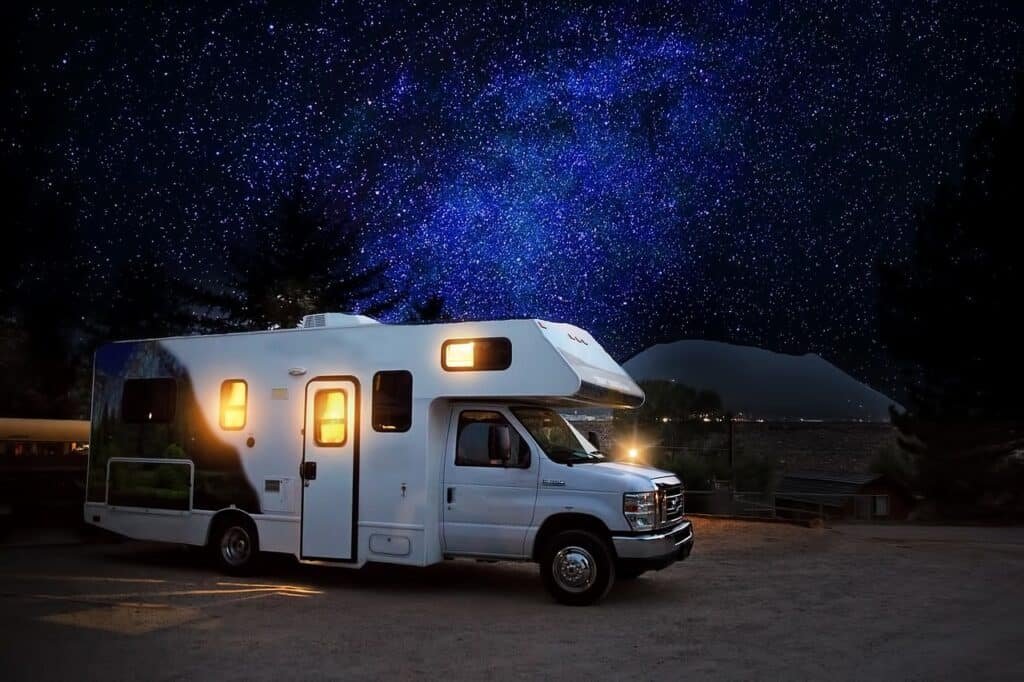
Are you dreaming of a life on the road, exploring new destinations, and embracing the freedom of a nomadic lifestyle? The allure of RV and van life has captured the imagination of many adventurers seeking a break from the conventional. But when it comes to choosing between an RV and a van, which option is the right fit for you? In this comprehensive guide, we’ll delve into the endless debate of RV vs. van life, exploring the pros and cons, costs, and experiences associated with each. So, buckle up and let’s hit the open road!
The RV Experience: Embrace the Journey

Why Choose an RV?
For those seeking a home on wheels, an RV offers the perfect blend of comfort and convenience. Whether you’re a seasoned road warrior or a newbie to the nomadic lifestyle, RVs provide a range of benefits that make them an attractive choice. Here are some reasons why you might consider an RV:
- Spaciousness and Comfort: RVs offer ample living space, with various floor plans and sizes to suit your needs. From compact Class B motorhomes to luxurious Class A behemoths, there’s an RV for every adventurer.
- Amenities and Facilities: RVs come equipped with essential amenities such as kitchens, bathrooms, and sleeping quarters. Many models even offer additional features like entertainment systems, slide-outs, and outdoor living spaces.
- Storage and Versatility: With generous storage compartments, RVs provide the freedom to bring along all the essentials for your journey. Whether it’s outdoor gear, bicycles, or extra supplies, an RV allows you to carry everything you need without compromising on living space.
- Comfortable Living: RVs offer the comforts of home, with climate control, comfortable furnishings, and the convenience of having your own bed, bathroom, and kitchen on the road.
The Pros and Cons of RV Life

Like any lifestyle choice, RV life comes with its own set of pros and cons. Let’s take a closer look at what makes RV life both exciting and challenging:
Pros of RV Life
- Flexibility and Freedom: With an RV, you have the flexibility to change your itinerary and explore new destinations at your own pace. You can wake up to breathtaking views, experience the great outdoors, and move from one scenic spot to another with ease.
- Community and Connection: RV parks and campgrounds provide opportunities to connect with fellow travelers and form lasting friendships. The RV community is known for its camaraderie and support, offering a sense of belonging on the road.
- Comfortable Travel: Unlike van life, RVs offer a smoother ride and greater stability on the road, making long journeys more comfortable and relaxing.
- Extended Living: RVs allow for extended stays in one location, enabling you to fully immerse yourself in the local culture and explore nearby attractions at your leisure.
Cons of RV Life
- Size and Maneuverability: RVs, especially larger Class A and Class C models, can be challenging to maneuver in tight spaces and crowded areas. Navigating narrow roads or finding parking in urban environments can be a hassle.
- Fuel Costs: RVs are notorious for their lower fuel efficiency compared to vans. The larger size and weight of an RV contribute to higher fuel consumption, resulting in increased costs at the gas pump.
- Maintenance and Expenses: Owning and maintaining an RV involves ongoing expenses, including insurance, repairs, campground fees, and regular maintenance. These costs can add up over time, impacting your budget.
The Van Life Experience: Embrace Minimalism on Wheels

Why Choose a Van?
Van life has captured the hearts of many adventurers seeking a more minimalist and nomadic lifestyle. Living in a van offers a sense of freedom, simplicity, and a closer connection to nature. Here are some reasons why you might consider van life:
- Mobility and Maneuverability: Vans are compact and agile, allowing you to navigate narrow roads, park in urban areas, and access off-the-beaten-path destinations that may be off-limits to larger RVs.
- Affordability and Cost Savings: Vans are generally more affordable than RVs, both in terms of upfront costs and ongoing expenses. With better fuel efficiency, van life can be a more budget-friendly option for long-term travel.
- Simplicity and Minimalism: Van life encourages a minimalist lifestyle, forcing you to declutter and prioritize the essentials. Embracing a simpler way of living can be liberating and help you focus on experiences rather than material possessions.
- Stealth Camping: Vans offer the advantage of stealth camping, allowing you to blend in with regular vehicles and park overnight in urban areas without drawing attention. This opens up a world of opportunities for urban exploration and spontaneous adventures.
The Pros and Cons of Van Life

Van life comes with its own set of pros and cons. Let’s explore the advantages and challenges of embracing the van life experience:
Pros of Van Life
- Flexibility and Adventure: Van life offers unparalleled freedom to go wherever your heart desires. You can chase the perfect sunrise, explore remote locations, and embrace the spontaneity of the road.
- Closer to Nature: Living in a van allows you to immerse yourself in nature, waking up to stunning views, and having the freedom to camp in picturesque locations that are off-limits to larger RVs.
- Minimalist Lifestyle: Van life encourages a minimalist mindset, helping you declutter, live more sustainably, and focus on experiences rather than material possessions.
- Affordability: Van life is generally more affordable than RV life, with lower upfront costs, reduced fuel consumption, and fewer expenses related to maintenance and campground fees.
Cons of Van Life
- Limited Space: Living in a van means embracing a compact living space. Limited storage, a smaller kitchen, and minimal bathroom facilities can be challenging, especially for long-term travel or for those traveling with companions or pets.
- Comfort and Amenities: While vans can be customized to include basic amenities, they often lack the same level of comfort and convenience as larger RVs. Space constraints may require sacrifices in terms of sleeping arrangements, bathroom facilities, and cooking capabilities.
- Weather Limitations: Vans may be less insulated than RVs, making extreme weather conditions more challenging to handle. Cold winters or scorching summers may require additional measures to ensure comfort and safety.
- Stealth Camping Challenges: While stealth camping can provide unique opportunities, it also presents challenges. Finding suitable overnight parking spots and adhering to local regulations can be more complicated in urban areas.
Cost Comparison: RV vs. Van Life
When considering the financial aspect of RV and van life, it’s essential to evaluate the costs associated with each option. Here’s a breakdown of the key cost factors to consider:
RV Life Costs
- Upfront Costs: RVs come in a range of prices, with new models costing anywhere from $50,000 to over $500,000. Used RVs offer a more affordable option, but it’s crucial to inspect the unit thoroughly and consider any potential repair or renovation costs.
- Insurance: RV insurance varies depending on factors such as the type of RV, usage, and your driving record. On average, RV insurance can range from $1,000 to $3,000 per year.
- Fuel Costs: RVs are known for their lower fuel efficiency, with larger models averaging around 8 to 10 miles per gallon. Fuel costs can vary depending on the distance traveled, fuel prices, and the size and weight of your RV.
- Campground Fees: Overnight camping fees at RV parks and campgrounds can range from $20 to $100 per night, depending on the location and amenities.
- Maintenance and Repairs: RV maintenance costs can include regular servicing, repairs, and the replacement of parts. Budgeting for routine maintenance and unexpected repairs is essential to ensure the longevity and reliability of your RV.
Van Life Costs
- Van Purchase: Vans vary in price, depending on factors such as age, condition, make, and model. Used vans can be found for as low as $5,000, while newer or customized vans can range from $30,000 to $100,000 or more.
- Conversion Costs: Converting a van into a livable space involves additional expenses, including insulation, electrical systems, plumbing, and interior furnishings. Conversion costs can range from a few thousand dollars to over $50,000, depending on the level of customization and desired amenities.
- Insurance: Van insurance costs depend on factors such as the van’s value, usage, and your driving record. On average, van insurance can range from $800 to $2,000 per year.
- Fuel Costs: Vans generally have better fuel efficiency than RVs, with mileage ranging from 20 to 30 miles per gallon. While fuel costs can vary, vans offer potential savings in this area compared to larger RVs.
- Campground Fees: Van life often involves more boondocking and free camping opportunities, reducing the need for paid campground fees. However, occasional stays at campgrounds or RV parks can range from $20 to $50 per night.
- Maintenance and Repairs: Vans require regular maintenance and occasional repairs, similar to any vehicle. Budgeting for routine servicing and unforeseen repairs is crucial to keep your van in optimal condition.
Choosing Your Path: RV or Van Life?
Ultimately, the decision between RV and van life boils down to your personal preferences, travel style, and budget. Consider the following factors when choosing the right path for your on-the-road adventure:
- Travel Style: Do you prefer the comforts and spaciousness of an RV or the minimalist freedom of van life? Consider your desired level of convenience, amenities, and the type of locations you wish to explore.
- Budget: Evaluate your financial resources and determine what you can comfortably afford in terms of upfront costs, ongoing expenses, and maintenance. RVs generally require a larger investment, while van life offers a more budget-friendly option.
- Size and Maneuverability: Reflect on your comfort level with driving a larger vehicle and navigating various road conditions. RVs can be more challenging to maneuver and park, especially in urban environments.
- Amenities and Comfort: Consider the amenities and facilities that are essential for your travel needs. RVs offer more space, comfort, and convenience, while vans prioritize simplicity and a closer connection to nature.
- Community and Social Interactions: Both RV and van life offer opportunities for community and connections with fellow travelers. Consider whether you prefer the camaraderie of RV parks or the more intimate, off-the-grid interactions of van life.
- Longevity of Travel: Decide on the duration of your travel and the level of comfort required for extended periods on the road. RVs provide more space and amenities for long-term travel, while van life may be better suited for shorter adventures.
Embrace Your Journey: RV or Van Life, the Adventure Awaits
Whether you choose the spaciousness and comfort of an RV or the simplicity and freedom of van life, both options offer incredible opportunities for adventure, self-discovery, and connection with nature. Embrace the journey, create unforgettable memories, and forge your own unique path on the open road. The choice between RV and van life is a personal one, so trust your instincts, follow your heart, and embark on the adventure of a lifetime. Safe travels!
